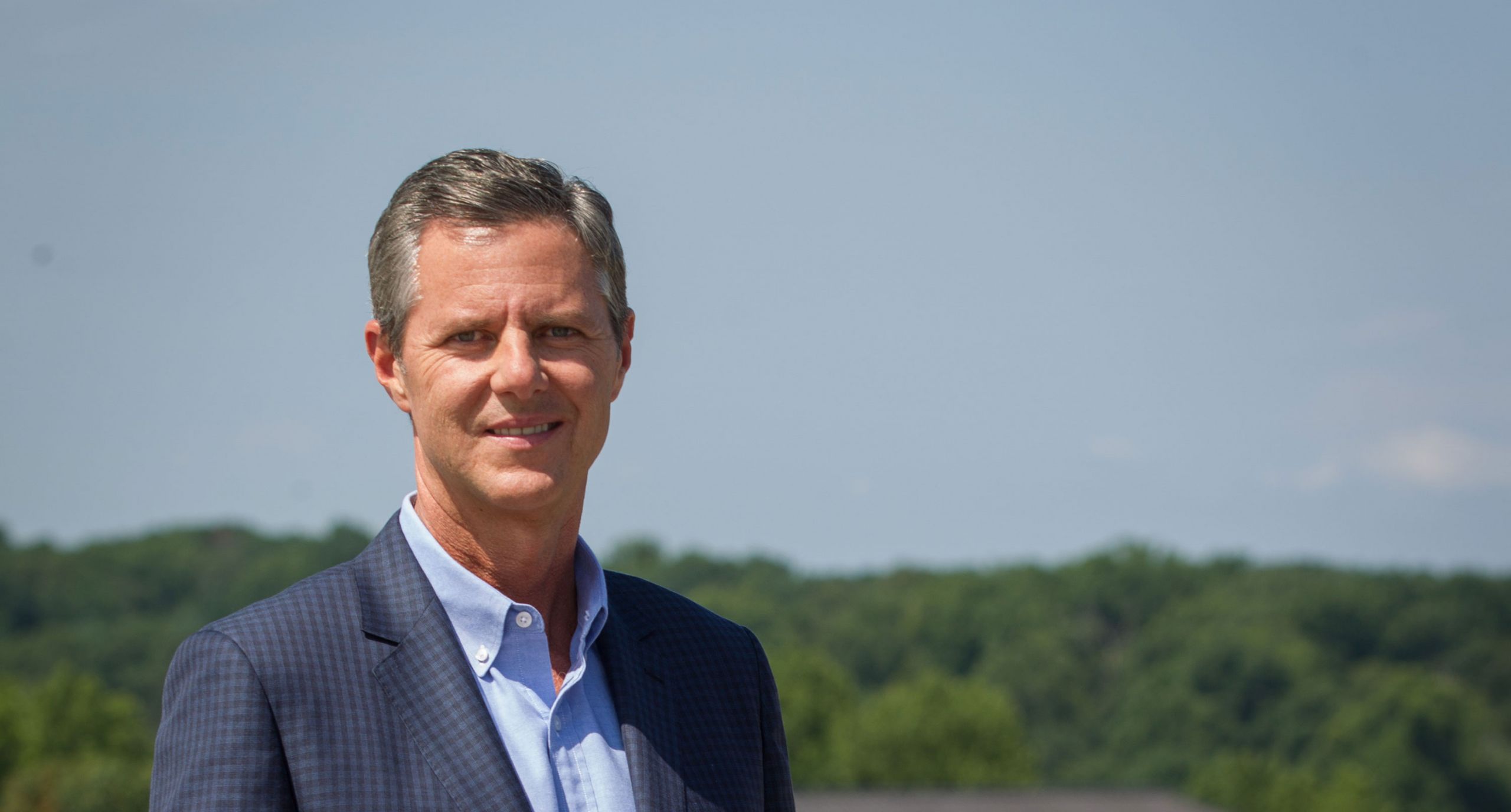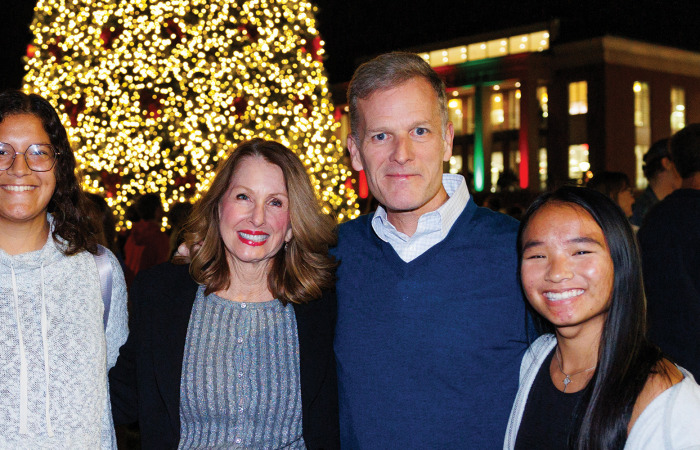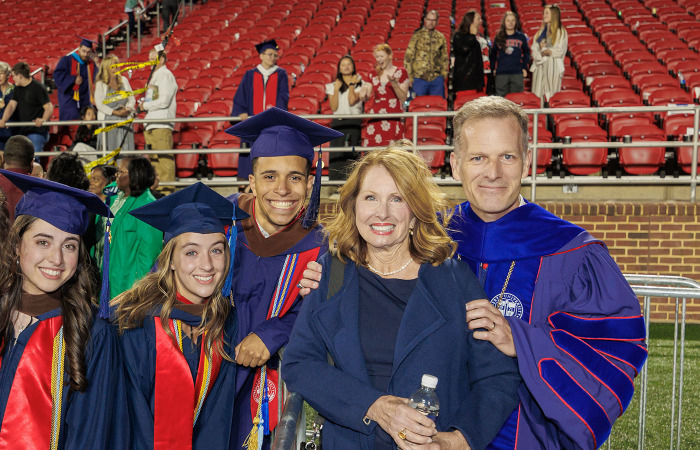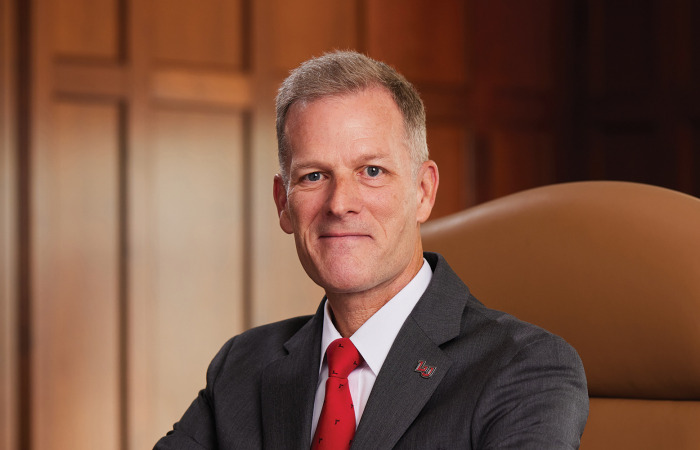President Jerry Falwell, Jr. addressed the student body for the first time this semester during the Aug. 28 Convocation, welcoming students and recounting the “unbelievable miracle story” of Liberty University.
Below is a portion of his speech, where he also made the announcement that Liberty co-founder Dr. Elmer Towns was taking a sabbatical. Towns most recently served as dean of Liberty University Baptist Theological Seminary and the School of Religion.
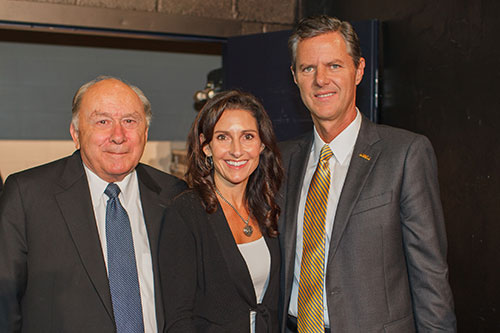
Elmer Towns, Becki Falwell, President Jerry Falwell, Jr.
“The story of how this university came into existence and how it eventually prospered is an unbelievable miracle story. This university was built on prayers, on faith, on tenacity, on determination, and on the blood, sweat, and tears of its leaders, its faculty, its staff, its early students, and millions of donors who gave sacrificially to make the school a reality. We are honoring one of those founders
here today.
You are the heirs of their sacrifice. When I became president in 2007, I often used the verse Luke 12:48, ‘To whom much is given, much shall be required,’ as one of my themes. But, at that time, I had no idea how much God was actually going to give to this university and how fast it was going to happen. Our responsibility as the second generation is even that much greater now that God has blessed this school so generously. I want to encourage you not to squander your opportunities here created by so many who sacrificed so much over the last four decades.
For those of you who are new to Liberty, my father founded Thomas Road Baptist Church in 1956. It is now located next door to campus. The church services were broadcast nationally in the ’70s and ’80s. He founded Liberty University in 1971 and the Moral Majority a few years later. Moral Majority was a coalition of Catholics, Protestants, Mormons, and Jews who shared pro-life and pro-family values and supported the state of Israel. Many credited the Moral Majority with the election of Ronald Reagan.
I attended Liberty, then went to the University of Virginia law school and came back to Lynchburg to practice law in 1988. I became Liberty’s general counsel a couple years later and spent 17 years helping my father and Liberty survive one financial crisis after another. Those were very stressful days both for us and for this institution. In those days, Liberty was overshadowed by the Old Time Gospel Hour television broadcast and the Moral Majority. Both were much better known nationally than Liberty was, so, in 1989, my father decided to change his priorities. He decided at that time that this university should be his number one priority because it had the potential to impact more people for Christ than anything else he was doing, through training thousands of graduates to go out in every profession as Champions for Christ. He shut down the Moral Majority in 1989, moved his office from the church to the university in 1990, and discontinued the national television broadcast in 1992.
But because the Moral Majority and Old Time Gospel Hour were so well-known, the media always thought of Liberty as a political organization or a church so they always sent a religion writer or a political writer, sometimes even a business reporter to cover what was happening at Liberty. The problem is that none of them really understood what Liberty was all about. Finally, with all the growth of the last few years, the media is now sending education reporters to cover Liberty. They seem to be getting it right because the fact is Liberty is not a church; it is not a political organization; it is not a business. It is a university and our mission is Training Champions for Christ. …
In recent interviews, I first explained that the one thing that defines Liberty is its uniqueness. My father wanted to create a university that not only trained young people to go into full-time Christian ministry but also into every other profession — to train doctors, lawyers, bankers, business people, musicians, and authors. The goal was to create for evangelical young people a world-class university, what Notre Dame is for Catholic young people and what Brigham Young is for Mormons. So many schools in the New World were established with the same mission as LU’s but abandoned their Christian foundations when they became prominent. Liberty’s goal is to become the first major American university to achieve academic excellence, success on the athletic field (NCAA Division I), and financial success, but at the same time remain true to the fundamentals of the Christian faith and to its Christian mission.
Part of that mission is to keep Christian education affordable and accessible. Liberty has kept its resident tuition in the lowest 25 percent of all private universities; online, our tuition is much less than our for-profit competitors.
The goal to keep education affordable and accessible led to the establishment of Liberty University School of Lifelong Learning (now Liberty University Online) in 1985 by my father and Dr. Ron Godwin (Liberty’s provost and senior vice president for Academic Affairs). In the first 20 years of its existence, Liberty Online struggled but those years allowed LU to make its external degree programs comparable to resident programs in academic quality. When high-speed Internet service became commonplace about 10 years ago, Liberty Online was poised to become a leader in online education. In the academic year that just ended, 92,000 students were enrolled in Liberty Online. These are mainly adults, average age 35, who either want to earn a bachelor’s or graduate degree but who cannot uproot their families, quit their jobs, and sell their homes to go to college. Serving this population has helped fulfill Liberty’s mission of making Christian education available to as many as possible and it has allowed us to improve our residential program in ways that we thought would take generations to complete. The huge population of students has given us the financial resources to rebuild the campus. (Go to www.Liberty.edu/MasterPlan).
The online program also benefits from the residential program. Online students love the fact that they are studying at a Christian university that has operated on this campus for decades. They enjoy supporting our athletic teams and travel to Lynchburg for intensives and for graduation. Liberty University Online would not be the nation’s largest nonprofit online university today if it were not anchored by a major residential Christian university with decades of history and solid academic performance standing behind it.
Liberty is proud that our student loan default rate is less than half the national average. That tells me that our graduates are finding jobs when they leave Liberty.
While it is exciting to see that Liberty has grown to become Virginia’s largest university, the nation’s sixth largest, and rated by Standard and Poor’s as one of the 78 strongest schools in the nation financially, Liberty’s larger goal is to redefine what it means to be a prestigious university. Bill Gates said recently that there is something perverse about the criteria used by the various ratings services that rank universities in this country in that they reward the schools that spend the most on the delivery of education and that exclude the greatest number of students from enrollment. In order to retain a high ranking, universities are forced to spend more and more and to look to their students to pay more and to taxpayers to subsidize them more. That model is so unsustainable for the future that Gates has invested his own money to find ways to deliver education the way Liberty does it, to run universities efficiently like businesses have to do, to treat students like customers, to keep costs and tuition low. At Liberty, we don’t want to be ranked as a top university if that means we have to spend more than we take in or if it means we have to reject promising students. We believe that, in the future, the measure of a quality institution will be based on how many students that university accepts and educates well, not on how many students are excluded in the admissions process.
What God is doing at and through this school is truly amazing, especially in such a short time. We are entering our 43rd year and we are not far from our very humble beginnings. I saw how humble those beginnings were this summer. Thomas Road Baptist Church was founded in a 50-by-50 building that served as the Donald Duck Bottling Company. We just restored that building and some adjacent former auditoriums for weddings and receptions. Between 1956 and 1970, Thomas Road Baptist Church experienced the same type of explosive growth that Liberty is experiencing now. I was born in 1962 and watched the amazing growth of the church and television ministry in the late 1960s and early 1970s.
I traveled with my father whenever I could as he spoke all over the country. The church built three new auditoriums in 12 years. Liberty was then founded in 1971. My father later said that he was glad he did not know then how difficult it was to start a university from scratch because he might not have done it. Years of hardship and struggles to build a campus, finance the new school, and obtain accreditation ensued. The rapid growth rate of the past slowed to a snail’s pace and we hit a plateau that seemed to last for almost 40 years. During those years, my father would often preach that for every good day there were many bad ones and that any person’s greatness was not determined by their talent or by their wealth but rather by what it took to discourage them. The theme of his sermons had changed from “Be number one and be the best at what you do” to “Don’t quit in the face of adversity.” I don’t know if God still sends his people to the wilderness like he did in Old Testament times, but it sure felt that way to us. Before my father’s death in 2007, he got a glimpse of what God had planned for Liberty. The school had turned the corner financially. He saw his dreams for Liberty starting to unfold. He caught a glimpse of Liberty’s promised land.
Dr. Elmer Towns played a key role in the formation of the school. He was co-founder and my father relied on him for advice on faculty hiring, curriculum, and other important matters. … I don’t know of anyone who is more deserving of some time to do the things he loves away from the classroom. Elmer says he is going to come back and teach in future years, but I believe he is going to enjoy his new assignment so much, that his sabbatical will become permanent. Elmer turned 80 recently and he is one of the founders that I mentioned earlier who has sacrificed so much for this school, for you, and for future generations of students who will attend this university. I want us to show Elmer our appreciation for his many years of service.”
